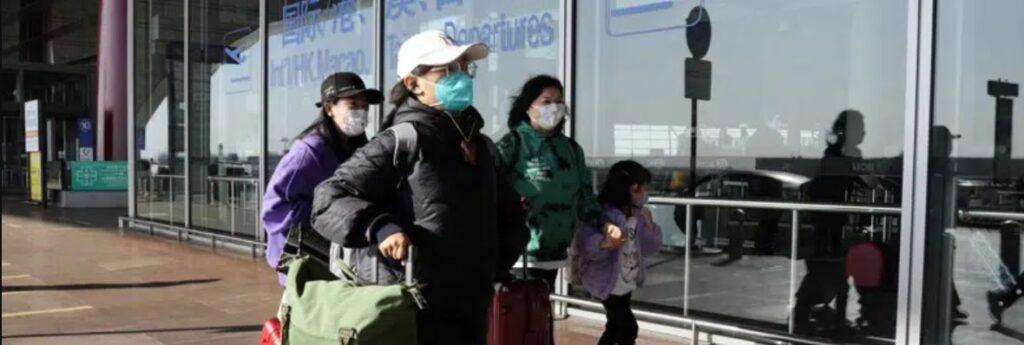Starting Jan. 5, the federal government will require air travellers aged two and older coming from China, Hong Kong, and Macao to test negative for COVID-19 before leaving for Canada. However, experts say the move will not help in preventing new variants or the spread of the virus.
Canada has joined a growing list of countries requiring travellers from the three destinations to take a test prior to boarding their flight, as China battles a nationwide outbreak of the coronavirus after abruptly easing restrictions that were in place for much of the pandemic.
Travellers will need to provide a negative COVID-19 test result – PCR or antigen –to the airline, taken no more than two days before their departure, before boarding a flight to Canada. Or passengers who tested positive more than 10 days before their flight leaves, but not more than 90 days, can provide the airline with proof of their positive test instead.
The measure, which will apply regardless of vaccination status, will be in place for 30 days and will be reassessed as more data and evidence becomes available.
Kerry Bowman, assistant professor at the University of Toronto’s Temerty Faculty of Medicine, called the requirement “absolutely a political move, and not based on science at this point.”
China’s reversal from strict COVID-19 control measures has caused widespread infection in that country, although there is not much known about what various Omicron variants are in circulation, said Bowman, who teaches bioethics and global health.
“I don’t think it’s a great idea. I don’t think it makes us safer. On the surface of it, looks like governments are being proactive and sensitive and protecting their citizens,” he said, adding, “But it’s pretty clear that point of entry screening is not very effective at all. Often people can test positive days and weeks later.”
Dr. Isaac Bogoch, associate professor at University of Toronto’s Temerty Faculty of Medicine, said it’s not entirely clear what the policy’s goals are, but such measures have not helped.
“We know from the past that very focused and targeted travel measures such as this don’t do much to prevent the spread of COVID, either by importing COVID to Canada, or by the threat of variants of concern in Canada,” he said.
Bogoch said it would have helped if China had been transparent with their COVID-19 data, variants, vaccines and spread.
“But let’s not pretend that requiring travellers from China to have a negative PCR test before coming to Canada will have any impact on the Canadian experience with COVID-19,” he said. “It won’t.”
Colin Furness, assistant professor at the University of Toronto’s faculty of information, said the situation regarding the travel requirement is complicated.
“This is political as well as social as well as public health,” he said. “It is likely to be perceived as political. It is likely to be perceived as racist. Those are obviously not helpful things.”
But the government should be concerned about new variants that may come out of China, he said.
Caroline Colijn, a mathematics professor at Simon Fraser University in Burnaby, BC, said testing requirements can probably reduce the rate of importation.
“If there’s a new variant, or just high levels of COVID in certain places, the rate of direct introduction from those places will probably be somewhat reduced by requiring negative tests, but it won’t completely prevent importation,” said Colijn, who is a Canada 150 Research Chair.
Isolating or quarantining travellers could help reduce the likelihood that chains of transmission get established after travel, she said. “So, requiring negative tests will just buy us a little bit of time.”
Governments and scientists have to face the possibility that there could be “a more severe, more immune invasive, more transmissible or more dangerous variant of this virus” and should draw up plans on next steps, she said.
While not a popular view, Furness said it would be much more effective if all governments required negative COVID-19 tests and vaccinations on all flights.
“Let’s be clear,” he said. “COVID is everywhere. COVID is all over the place. So, these sorts of measures that three years ago might have been enormously effective at limiting spread, it isn’t going to do very much now.”
Research has shown how the virus spreads through human mobility, which means that the next variant of the virus may not even emerge from China, and even if it did, it could land in Canada from other indirect routes, Bogoch said.
Canada hasn’t been able to prevent variants as seen with Alpha, which emerged in the United Kingdom, Delta that was first discovered in India and Omicron, which arose in southern Africa, he said.
“So just requiring a negative PCR test from Chinese travellers, from a science and medical standpoint, will not have much impact for Canada,” he said.
“And that’s just unfortunately the way it is. What we can do is take measures to help reduce the burden of COVID in Canada, but we’re not going to stop the importation of this infection.”
A more effective measure, Bowman said, would be testing wastewater from airplanes and airports to check for the viral load and mutations.
Vancouver International Airport said Saturday it would expand its wastewater testing pilot program.
One of the variants, XBB.1.5, causing concern and spreading rapidly is already in North America, Bowman said.
“It’s so important that we stay evidence based,” he said. “I think in the years ahead when this story is told, when we have some objectivity, which I don’t think any of us really have, including me – when we’re really away from this – I think when we look at the big picture globally, we’re going to see that we did a lot of things that were much more political than evidence based.”

